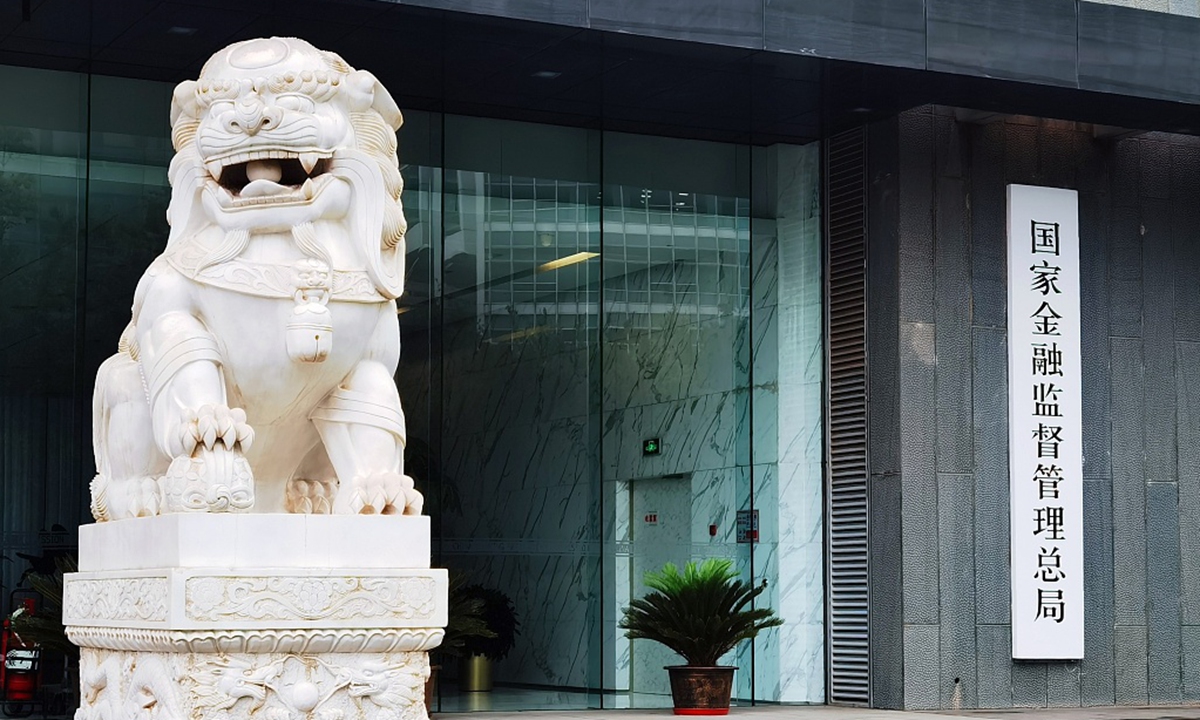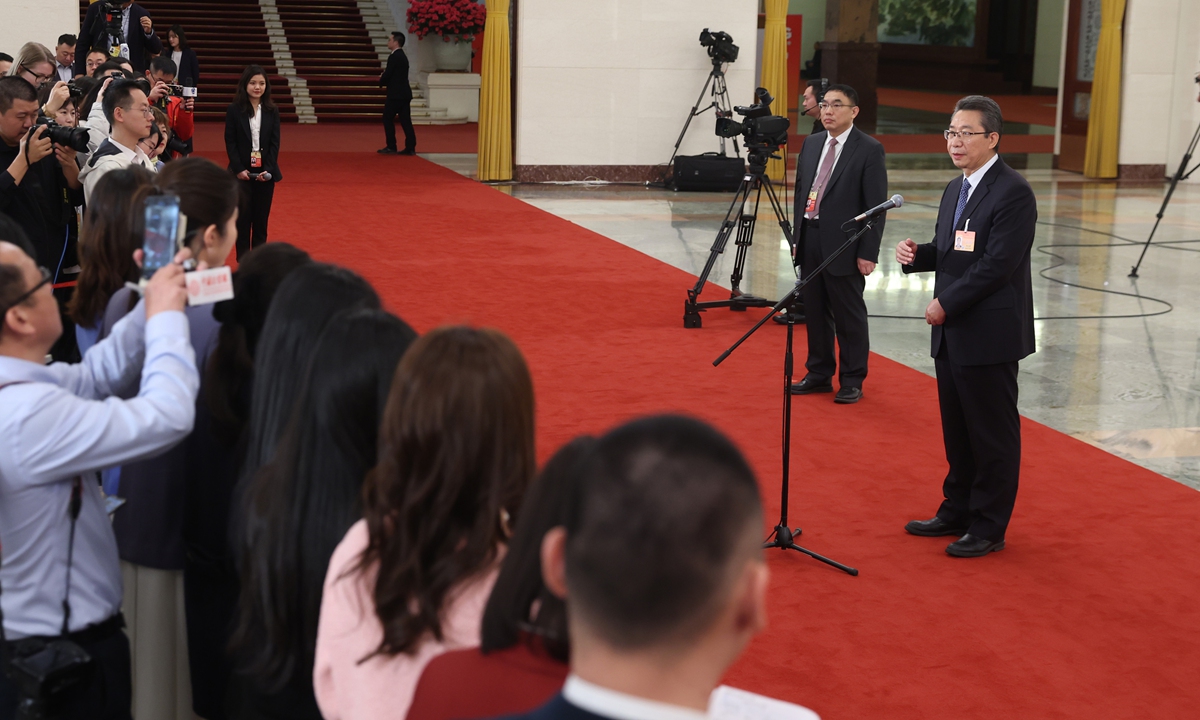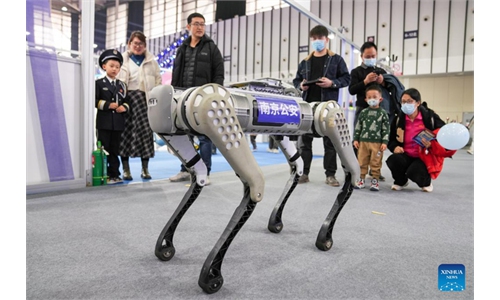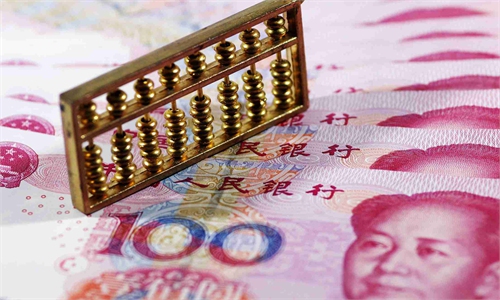Chinese officials vow to tackle financial risks, boost development after two sessions

The National Administration of Financial Regulation is established on May 18, 2023 and is in charge of regulating the entire financial businesses excluding the securities sector, which is administered by China Securities Regulatory Commission. Photo: VCG
Chinese officials on Monday vowed to make concrete efforts to mitigate financial and other risks and boost high-quality development following the two sessions, which concluded on the day in Beijing, where a slew of social and economic development targets were determined for the year.
As the Government Work Report approved by the National People's Congress (NPC), the top legislature, called for greater efforts to effectively prevent and resolve risks in key areas, officials in various economic and financial fields stressed that they are rolling out a slew of measures to help tackle risks and will be able to ensure security and stability.
With the two sessions successfully concluded, the top priority for officials at all levels is to carry out policy measures to make sure that various development goals outlined in the Government Work Report will be met, economists said, as officials have plenty of tools at their disposal to do so thanks to the country's solid economic foundation.
"As the two sessions have concluded, the next step is to focus on implementation," Li Yunze, head of the National Financial Regulatory Administration (NFRA), told reporters on Monday afternoon, after the closing meeting of the second session of the 14th NPC. He remarked that China's financial risks are generally controllable.
Noting that China's long-term positive development trend has remained unchanged and the NFRA has more tools to prevent and resolve financial risks, Li said that "China has the confidence, conditions and capabilities to maintain financial security," according to a Xinhua report.
Tackling financial and other risks has become a top priority, as the Government Work Report called to better coordinate development and security, and to effectively prevent and resolve risks in key areas. Specifically, the report urged to address both the symptoms and root causes to resolve risks in areas such as real estate, local debt, and small and medium-sized financial institutions, so as to maintain overall economic and financial stability.
Cong Yi, a professor at the Tianjin University of Finance and Economics, said China has been focused on tackling risks in various areas, including in real estate and local government debts, and has achieved "quite good" results. Though further efforts are still needed, "generally speaking, the risks are controllable," Cong told the Global Times on Monday, noting that the Government Work Report also contained various major measures to tackle risks.
This year's Government Work Report, budget report, and the economic and social development plan report approved by the NPC have all laid out comprehensive strategies to prevent and resolve local debt risks. Among various measures, the central government plans to issue ultra-long special treasury bonds starting this year and over each of the next several years, which analysts said could help ease local government debt pressures.
"Thanks to efforts to tackle financial risks in recent years, our risk-fighting tools are advanced and there are also more tools in our tool box," Li Chang'an, a professor with the Academy of China Open Economy Studies of the University of International Business and Economics, told the Global Times on Monday.
Li said on Monday that the NFRA is working with local authorities to implement precise measures to effectively resolve risks in an orderly manner. The financial regulator will also step up financial support for major projects and further implement the financing coordination mechanism for the real estate sector.
The NFRA will also fully support scientific and technological innovation to help develop new quality productive forces and expand effective consumption, Li said.
Boosting growth
Accelerating the development of new quality productive forces, which focuses on sci-tech innovation and breakthroughs, and expanding effective consumption have also become a key theme at the just-concluded two sessions and the top priorities for China's economic agenda for 2024 and beyond, as the country aims to boost high-quality development.
In order to speed up the development of new quality productive forces, Shen Changyu, head of the China National Intellectual Property Administration (CNIPA), said on Monday that the CNIPA will further bolster the protection of intellectual property rights (IPRs) and treat all state-owned enterprises, private businesses and foreign companies equally in terms of IPR protection.
Shen said China will also step up the transformation and application of patents and cultivate more specialized small and medium-sized enterprises in the high-tech sector. At the end of 2023, China owned more than 4 million domestic valid invention patents, up 22.4 percent year-on-year, according to the CNIPA.
Chinese officials have also vowed to step up efforts to support various aspects of the Chinese economy, from tourism to exports, as China has set a GDP growth target of around 5 percent this year.
Yu Jianhua, head of the General Administration of Customs (GAC), said on Monday that China's trade sector has got off to a solid start in 2024, and imports and exports are expected to remain on a growth trend in the first half of the year.
Also speaking to reporters after the closing meeting of the second session of the 14th NPC, Yu said that in order to achieve the full-year development goals laid out in the Government Work Report, the GAC will roll out targeted policy measures to boost cross-border trade and improve services to support businesses' operations.
According to the GAC, China's imports and exports of goods in the first two months of 2024 hit a record high of 6.61 trillion yuan ($918.3 billion), up 8.7 percent year-on-year, beating forecasts and singling a positive start to the new year.
Also, in a bid to boost domestic tourism, Sun Yeli, minister of culture and tourism, said on Monday that China's tourism industry has seen a robust recovery over the past year, particularly since the beginning of 2024, and given Chinese consumer's enthusiasm to travel, "the tourism boom" will continue.
Beyond the support measures for specific areas, China also has plenty of macro-policy tools to support the economic recovery and ensure that the growth target will be met at the end of 2024, economists said.
For example, given the low inflation, "we still have plenty of room for monetary policy," during this phase of economic recovery, Cong said.
During a press conference on Wednesday on the sidelines of the two sessions, China's monetary policymakers said they have a rich toolbox and ample options, and there is still further room to slash the reserve requirement ratio.

Shen Changyu, head of the China National Intellectual Property Administration, meets journalists after the 14th National People's Congress concludes its second session on March 11, 2024. Foreign applicants held more than 900,000 valid invention patents in China by 2023, up 4.9 percent year on year, showing that foreign enterprises attach great importance to the Chinese market, Shen told the press. Photo: cnsphoto




